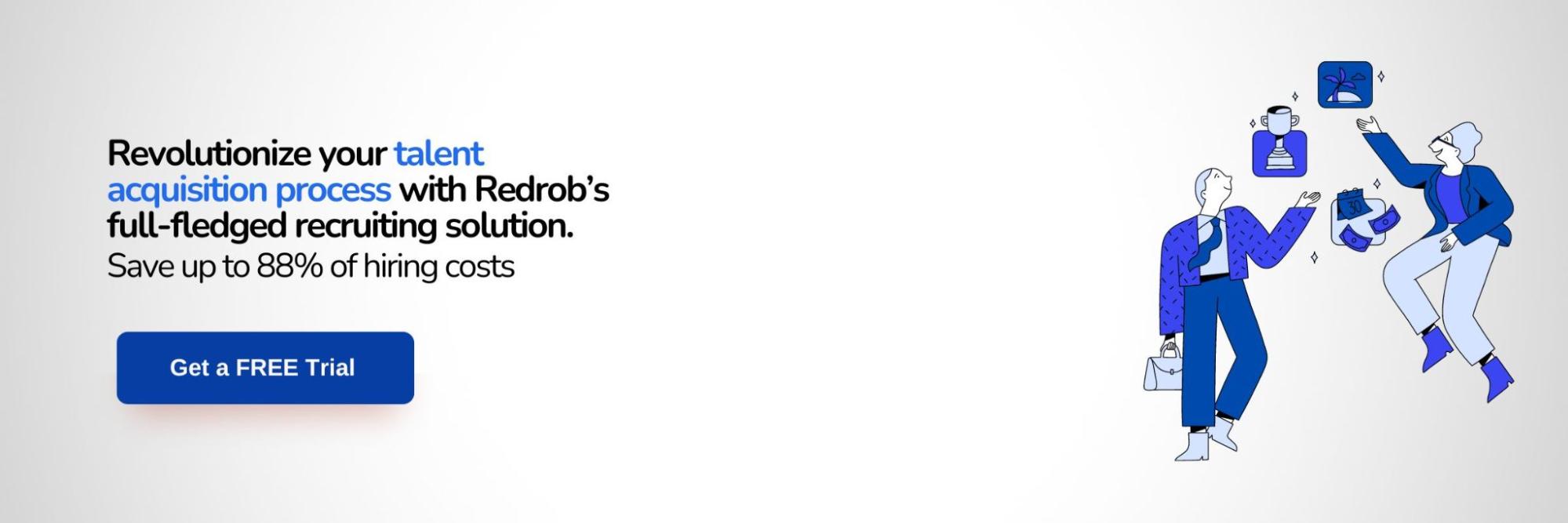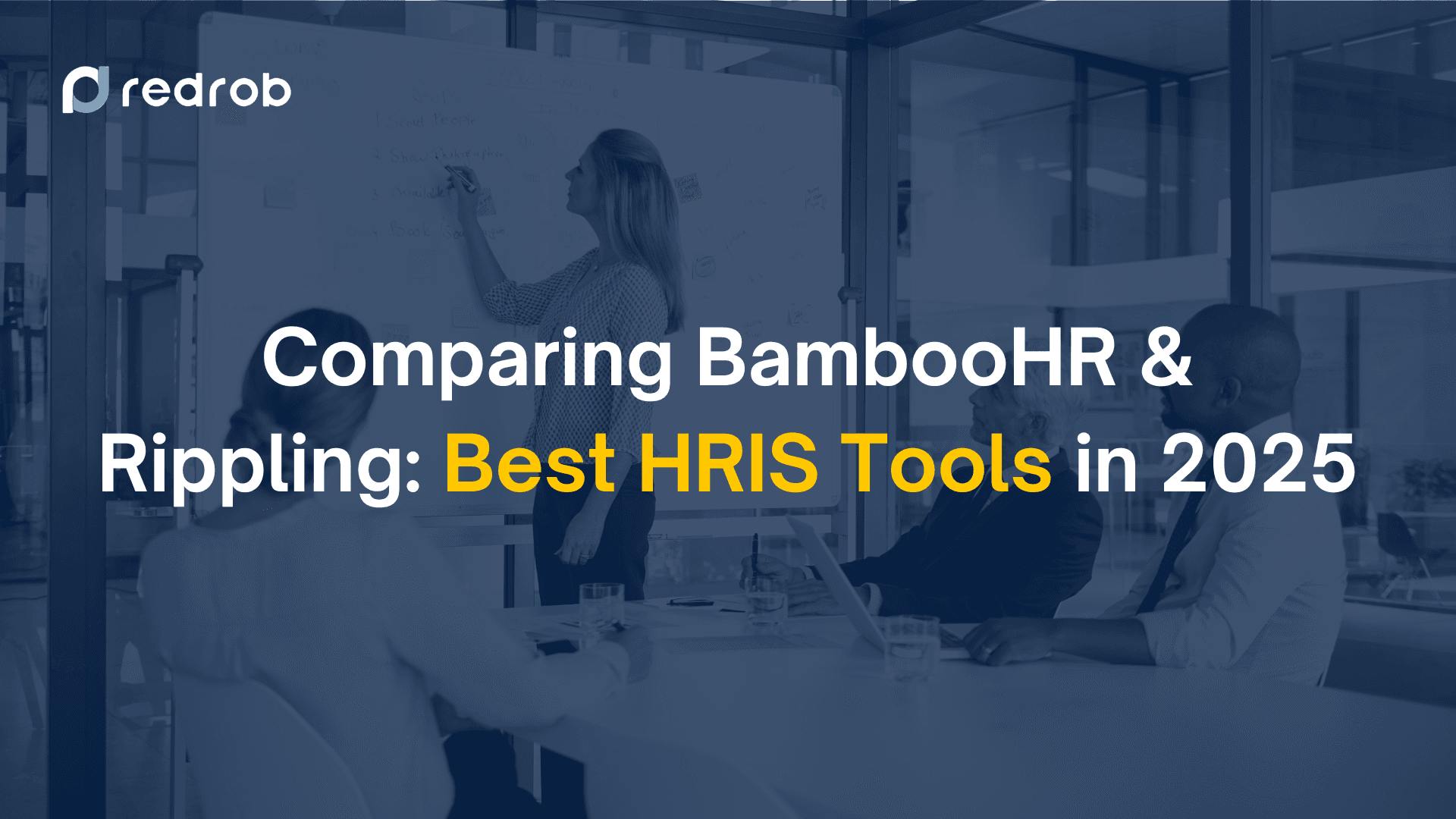Conducting and Evaluating Interview Candidates
8
•
Sep 20, 2024

Soumyata Singh
Meeting your recruitment goals requires you to go through the many stages - sourcing candidates, analyzing their skills, interviewing them, and onboarding. While many recruiters may think it’s easy to interview candidates, let us tell you, assessing and convincing the best ones to join your company at fair terms isn’t as simple.
As per sources, around 46% of job seekers declined a job offer because of the interviewer’s attitude or behavior. Thus, you have to be very careful with how you lead the interview, assessing the candidate while also getting their interest, trust, and reliability.
Therefore, in this blog we decided to share a few important tips to interview candidates and evaluate them well. Keep reading!
7 Important Tips for Evaluating Interview Candidates
Consider these important tips before you interview candidates and evaluate them for respective job roles.
1. Determine the Interview Format
Choosing the right interview format is key to evaluating each interview candidate effectively. Setting up a structured process will ensure you get the best insights from each step.
Map Out the Number and Sequence of Interviews
Decide how many interview rounds you need. You might have an initial phone screen followed by a technical round and a final interview. This sequence ensures a clear process and provides multiple opportunities to assess an interview candidate. A structured approach helps you evaluate skills, cultural fit, and potential more effectively.
Decide on Remote Versus In-Person Interviews
Determine whether interviews will be in-person or remote. Remote interviews have become common, with 93% of employers opting for them post-pandemic. This format offers flexibility and can save time for both you and the interview candidate. In-person interviews, however, allow you to assess body language and build a stronger connection. Consider what’s best for your team and the candidate's location.
Include an Interview Committee
Form an interview panel with managers and peer-level employees. Involving multiple perspectives in the interview process ensures that you're getting a well-rounded evaluation. A manager may focus on leadership skills, while a peer might assess how well the interview candidate fits into the team culture. This approach prevents any single person from making a biased decision and improves overall fairness.

2. Craft an Interview Script
Creating an interview script ensures consistency and fairness in evaluating each interview candidate. A well-planned script helps you stay focused and ask relevant questions during the interview process.
Create a Script Based on the Job Post or Key Responsibilities
Start by reviewing the job post. Identify the core responsibilities and skills required for the role. Use these to craft questions that target the specific needs of the job. For example, if you're hiring for a project manager role, ask about the candidate’s experience managing deadlines and budgets. Tailoring your questions to the role helps you assess whether the interview candidate can meet the job's demands.
Include Behavioral Questions to Assess the Candidate's Potential
Behavioral questions are a great way to evaluate how an interview candidate might perform in future situations. These questions help you understand how the candidate thinks and reacts under pressure. For instance, asking, “Can you describe a time when you resolved a conflict within your team?” can reveal problem-solving and communication skills. Studies show that 75% of employers use behavioral questions to predict future success.
Phrase Questions to Obtain Examples of Past Performance
Ask questions that require the candidate to share specific examples of their past work. This technique, known as the STAR method (Situation, Task, Action, Result), provides clear insights into how they handle real challenges. For example, you could ask, “Tell me about a time when you led a project under a tight deadline.” Past behavior often predicts future performance, making these questions essential for evaluating the interview candidate.
3. Review Candidate Resumes in Advance
Reviewing resumes before the interview helps you ask targeted questions and assess each interview candidate more effectively. Personalized questions show that you're prepared and make the interview more engaging.
Prepare Questions Based on the Candidate's Resume
Carefully review each resume before the interview. Identify key achievements, skills, and experience relevant to the role. For example, if the interview candidate has led successful projects, ask how they managed deadlines and resources. This approach helps you gauge if they can apply those skills to your organization’s needs.
Tailor Interview Questions to the Specifics of Each Resume
Tailor your questions based on the unique details of each candidate’s background. If an interview candidate has worked in a similar industry or used specific tools, ask how that experience will benefit your team. Customized questions also show that you value the candidate’s experience, creating a more positive interview experience.
Redrob reviews candidates’ resumes for you and ranks them based on important criterias such as work experience, educational background, skill match, etc, saving 92% of hiring time for you. Get to know us better.
4. Structure the Interview Clearly
A clear structure keeps the interview on track and helps you evaluate each interview candidate efficiently. It ensures the meeting stays organized and focused on the key points.
Provide a Roadmap for the Meeting, Including the Time Required
Start by outlining the interview's structure. Let the interview candidate know how long the meeting will take. For example, you could say, “This interview will take 45 minutes. We'll discuss your experience, followed by questions from both sides.” Providing a clear timeline helps the candidate stay focused and allows you to manage the time effectively.
Briefly Describe the Company and Role
Give a short overview of your company and the position you're hiring for. This helps the interview candidate understand the business and what’s expected in the role. You might say, “Our company focuses on tech solutions, and the position involves leading development projects.” This sets the stage for the interview, giving the candidate context for the questions that follow.
Inform the Candidate About the Interview Process and When They Can Ask Questions
Clearly explain the interview process and when the interview candidate can ask questions. For instance, tell them when to expect feedback and how many rounds of interviews will follow. Also, encourage them to ask questions either at the end or during a specific section. This approach reduces confusion and makes the interview feel more like a conversation.
5. Listen More Than You Speak
Active listening is crucial in any interview. It allows you to fully understand the interview candidate's responses and gain deeper insights into their potential.
Avoid Dominating the Conversation
As an interviewer, it's easy to dominate the conversation, but this limits the candidate's opportunity to share their thoughts. Aim to keep your speaking time brief, focusing on asking clear questions. This ensures the interview candidate has enough room to express themselves fully. Studies show that interviewers who listen more tend to make better hiring decisions.
Give Candidates Ample Space to Talk
Provide the interview candidate with the space to elaborate on their answers. Let them take their time to explain their experiences and skills. Silence can be a valuable tool—give the candidate a few extra seconds to think if needed. This helps create a more relaxed atmosphere and encourages more detailed responses. Giving ample room for discussion also improves engagement and makes the interview feel less rushed.
Aim to Speak No More Than 20% of the Interview Time
Strive to speak no more than 20% of the time during the interview. By doing so, you allow the interview candidate to take control of the conversation and demonstrate their qualifications. This ratio ensures that you gather enough information without overwhelming the candidate with excessive commentary. Keeping the focus on the candidate helps ensure a thorough and fair evaluation.
6. Maintain Professional Conduct
Professionalism during an interview helps you create a fair and respectful environment for the interview candidate. It reflects well on your company and ensures the candidate feels valued.
Keep a Polite and Professional Attitude Throughout the Interview
Always remain polite and professional when speaking with an interview candidate. Simple gestures like welcoming them warmly and thanking them for their time make a big difference. Maintaining eye contact and listening attentively also reinforces your professionalism. A positive interview experience boosts the candidate’s perception of your organization, increasing the likelihood that they'll accept an offer if extended.
Avoid Irrelevant Topics That Could Introduce Bias
Stick to topics that are directly related to the job. Avoid personal questions or discussions about irrelevant subjects that could lead to unconscious bias. For example, asking about family life or personal beliefs is inappropriate and can lead to discrimination claims. Keeping the conversation job-focused ensures fairness for every interview candidate and strengthens your hiring process.
Use a Consistent Script and Question Sequence for All Candidates
Using the same script and set of questions for every interview candidate ensures consistency. It allows you to compare candidates on equal grounds and reduces the chance of bias creeping in. Research shows that structured interviews lead to better hiring decisions by providing a fair and consistent framework for evaluation. Always make sure that each interview follows the same structure, ensuring a fair assessment for every candidate.
7. Follow Up and Keep Candidates Informed
Staying organized and responsive after the interview is crucial for leaving a positive impression on each interview candidate. Clear communication shows professionalism and respect for their time.
Avoid Common Mistakes Like Being Disorganized or Unresponsive
One of the biggest mistakes you can make is not following up. Disorganization or a lack of response can frustrate an interview candidate and harm your company's reputation. Candidates appreciate clarity about the next steps, so make sure you're organized and stay responsive. Statistics show that 65% of candidates say they never or rarely receive any communication after submitting an application or interview.
Follow Up With Candidates After the Interview
After each interview, follow up with the interview candidate promptly. Even if they aren't selected, send them a message thanking them for their time and informing them of your decision. A timely follow-up keeps candidates engaged and reflects well on your company’s professionalism. It also helps maintain a good relationship with potential future hires.
Ensure Consistency and Engagement, Especially in Remote Interviews
For remote interviews, consistency in communication is even more critical. Make sure you engage with each interview candidate in the same way you would for in-person interviews. Inform them about the process and next steps. Remote settings may create feelings of detachment, so keeping candidates updated is essential for maintaining their interest.
A smooth interview process ends with a thorough evaluation, ensuring the right candidates are selected based on merit. Make sure to follow the above-mentioned tips to provide good experience to your candidates while shortlisting the best ones.
Interview Candidates Hassle-free With Redrob

Preparation and professionalism are key to conducting effective interviews. By structuring your process and being well-organized, you create a positive experience for each interview candidate. It's crucial to evaluate each candidate thoroughly to ensure you hire the best fit for your team. Applying the above-mentioned tips will help you streamline your interviews and make more informed hiring decisions.
Redrob’s full-fledged ATS offers you the live interview assessment feature along with various others like applicant tracking, profile ranking, candidate shortlisting and more. You get centralized management for your recruitment pipeline, reducing candidate screening time by 60% and per hire costa by 88%.
Sounds lucrative? Explore Our Plans and Start Your FREE Trial Now!



